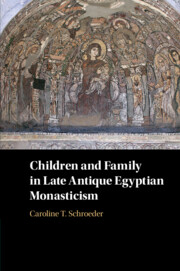Book contents
- Children and Family in Late Antique Egyptian Monasticism
- Children and Family in Late Antique Egyptian Monasticism
- Copyright page
- Dedication
- Contents
- Figures
- Acknowledgments
- Abbreviations
- Introduction
- Part I Finding Children
- Part II Representations
- Part III A Social History
- Chapter 6 Making New Monks
- Chapter 7 Breaking Rules and Telling Tales
- Chapter 8 The Ties That Bind
- Conclusion
- Bibliography
- Index of Ancient Sources
- Index of Names and Subjects
Chapter 8 - The Ties That Bind
Emotional and Social Bonds between Parents and Children
from Part III - A Social History
Published online by Cambridge University Press: 18 September 2020
- Children and Family in Late Antique Egyptian Monasticism
- Children and Family in Late Antique Egyptian Monasticism
- Copyright page
- Dedication
- Contents
- Figures
- Acknowledgments
- Abbreviations
- Introduction
- Part I Finding Children
- Part II Representations
- Part III A Social History
- Chapter 6 Making New Monks
- Chapter 7 Breaking Rules and Telling Tales
- Chapter 8 The Ties That Bind
- Conclusion
- Bibliography
- Index of Ancient Sources
- Index of Names and Subjects
Summary
Monastic sources warn of the distractions and even dangers of maintaining familial attachments once in the monastery. Affective bonds between children and parents prove to be some of the most contested relationships in the communities. These bonds are further complicated by being intertwined with economic ties and social bonds. Regulating emotions was an important element of the asceticism practiced at the White Monastery (led by Shenoute and then Besa), Jerome's and Paula's monasteries, and Cassian's monastery.These authors and ascetic leaders urged monks male and female to discipline their emotions toward their relatives and redirect their affect in what they deemed to be more appropriate direction, such as positive affect for their monastic family and reverence for God. They also used these familial bonds as points of leverage, appealing to emotions between family members to manipulate and influence others. Thisdiscourse is gendered, with ideal emotional states reflecting ideals of masculinity and femininity held by the authors. Additionally, these emotional ideals are influenced by classical philosophy (especially Stoicism) and shaped through biblical interpretation.
- Type
- Chapter
- Information
- Children and Family in Late Antique Egyptian Monasticism , pp. 160 - 190Publisher: Cambridge University PressPrint publication year: 2020

